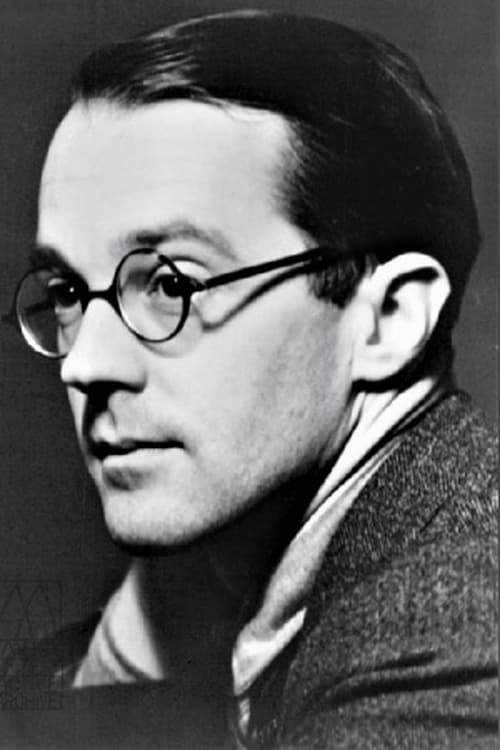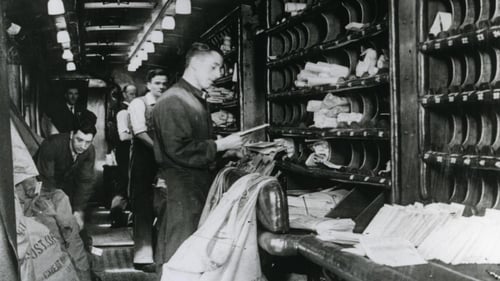
Basil Wright
Nacimiento : 1907-06-12, Frieth, Buckinghamshire, England
Muerte : 1987-10-14
Historia
Basil Wright - was a documentary filmmaker, film historian, film critic and teacher. During World War II, Wright worked only as a producer, first at John Grierson's Film Centre before joining The Crown Film Unit between 1945 and 1946 as producer-in-charge. Among the best known films he produced for Crown are Humphrey Jennings' A Diary for Timothy (1946) and A Defeated People (1946) and Instruments of the Orchestra (1946) featuring Benjamin Britten's The Young Person's Guide to the Orchestra.[1] Returning to direction in the early 1950s, his films included Waters of Time (1951) made for the Festival of Britain, World Without End (1953) directed with Paul Rotha for UNESCO and Greece: The Immortal Land (1958) in collaboration with his friend the artist Michael Ayrton.
Writing throughout the 30s and 40s, Basil Wright had contributed to the theoretical development of documentary in the movement's journals Cinema Quarterly, World Film News and Documentary Newsletter. He was the film critic for The Spectator after Graham Greene left. Wright was a regular contributor to the British Film Institute's Sight and Sound during the 1940s and '50s. He published a small book: The Uses of Film (1948) and his personal (extensive) history of cinema The Long View (1974). He taught at the University of Southern California (1962 and 1968), The National Film and Television School in London (1971–73) and Temple University in Philadelphia (1977–78). He was Governor of the British Film Institute, a fellow of the British Film Academy and President of the International Association of Documentary Filmmakers.
In his films Wright combined an ability to look closely and carefully at a subject with a poetic and often experimental approach to editing and sound. In Britain he is commemorated with a film prize awarded biennially by the Royal Anthropological Institute.

Himself
Narrated by Eric Morecambe and Ernie Wise, this documentary about "Laurel and Hardy", one of the most popular and critically acclaimed comedy double acts of the early Classical Hollywood era of American cinema. It features interviews with Jerry Lewis, Dick Van Dyke, Babe London, Marcel Marceau, Lucille Hardy (Ollie's wife), Bob Monkhouse, Hal Roach, Marvin T Hatley, Jack McCabe and many more.

Producer
A BAFTA award nominated documentary looking at an exhibition of Da Vinci's drawings at Burlington House in London, marking the quincentenary of his birth.

Director
UNESCO-funded "one world" documentary by Paul Rotha and Basil Wright.

Producer
This brief documentary-style film presents the status of Great Britain near the end of the Second World War by means of a visual diary for a baby boy born in September, 1944. Narration explains to "Timothy" what his family, his neighbors, and his fellow citizens are going through as the war nears its end, and what problems may remain for new Englishmen like Timothy to solve.

Producer
The occupation of the Channel Islands.

Producer
Propaganda short showing how London is coping with World War II.

Producer
In a bid to encourage city-dwellers to leave behind the restrictions of war, 'The Green Girdle' escapes from the austere urban landscape of inner-city London and savours the natural delights of the capital’s rural surroundings.

Producer
A 1940 black and white film, production sponsored by the Colonial Empire Marketing Board. 'The East African colonies are introduced as representative examples of the Colonial Empire. A tribal dance hints at the "life of fear and uncertainty" replaced by British rule, a village's "squalor" the need for continued war on "ignorance, poverty and disease." "Much can be achieved by money and the initiative of the White Man:" film hints at hydro-electric schemes, modern harbours (Mombasa), roads, bridges etc and illustrates in more detail hospital expansion; tsetse fly research and control; relieving malnutrition; agricultural improvement; education (primary school; Makerere College)." - Abridged version of synopsis on colonialfilm.org

Writer
A documentary by Jirí Weiss

Director
The history of Scotland and the factors that have shaped the character of its people.

Director
Short documentary about British education in the late 1930s.

Editor
This documentary short examines the special train on which mail is sorted, dropped and collected on the run, and delivered in Scotland on the overnight run from Euston, London to Glasgow.

Director
This documentary short examines the special train on which mail is sorted, dropped and collected on the run, and delivered in Scotland on the overnight run from Euston, London to Glasgow.

Editor
Ambitious documentary chronicling the cultural life and religious customs of the Sinhalese and the effects of advanced industrialism on such customs.

Director of Photography
Ambitious documentary chronicling the cultural life and religious customs of the Sinhalese and the effects of advanced industrialism on such customs.

Director
Ambitious documentary chronicling the cultural life and religious customs of the Sinhalese and the effects of advanced industrialism on such customs.

The film, made to advertise domestic telephone sets, is based around two very different families. The Petts are conventional, happy and have children; the Potts are unconventional and unhappy, without children.

Director
A celebration of the importance of the British countryside.

Cinematography
An overview of the shepherd's life during the lambing season.

Director
An overview of the shepherd's life during the lambing season.

Additional Photography
Grierson set out to make "propaganda," and this film--with it's voice-over proclaiming the great value of the British industrial worker, without a hint of ambiguity or doubt--fits that category well. The authoritatarian narrator feels out-of-date and unsophisticated, but the footage is well shot and interesting, and the transparency of the propaganda aspect is almost a reflief at a time when so many films have hidden agendas.

Experimental documentary focusing on a day in the life of city workers, featuring montage sequences and repetition to emphasise the monotony of routine office work.


